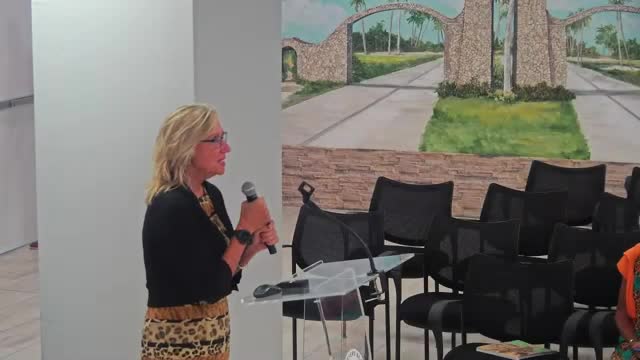Fort Myers Beach holds advisory‑board training on Sunshine Law, public‑records and ethics
Get AI-powered insights, summaries, and transcripts
Subscribe
Summary
Town attorney Nancy Stuparich and Town Clerk Amy led a 82‑minute training for advisory board members on Florida's Sunshine Law, Chapter 119 public‑records rules and state ethics requirements, including disclosure forms and penalties for violations.
Fort Myers Beach — Town attorney Nancy Stuparich and Town Clerk Amy presented a training session on Oct. 22 for Fort Myers Beach advisory‑board members covering Florida's Sunshine Law (open meetings), Chapter 119 public‑records law and selected provisions of Chapter 112 governing conflicts and gifts.
The presentation, attended by multiple advisory‑board members and staff, reviewed when a meeting is "in the sunshine," what counts as a meeting (including emails, texts and social‑media interactions among members), how public‑records requests are processed through the town's NextRequest portal, and the ethics obligations that can lead to required filings such as Form 8B and the annual Form 1.
Stuparich opened by stressing the basic rule of openness: "any meeting at which official acts are taken or where public business is talked about has to be in the open and has to be noticed to the public," and explained that the Sunshine Law applies to appointed advisory boards as well as elected bodies. She said a meeting can be a formal meeting, a workshop, or informal communications that constitute deliberation — including telephone calls, text messages, emails and comments on social media if those communications involve two or more members of the same board discussing matters that may foreseeably come before that board.
The training clarified three practical points for advisory members: (1) two‑way communications among members about board business should occur at noticed public meetings; (2) one‑way informational communications (for example, an article or document) may be distributed but should be routed through the town clerk so the distribution is preserved as a public record and to avoid reply‑all interactions that could create a Sunshine Law issue; and (3) audiovisual recording by the public cannot be broadly banned, although disruptive behavior can be limited.
On public records, Stuparich and Amy summarized Chapter 119 and the town's procedures. Amy instructed attendees to use the town's NextRequest portal on the town clerk's webpage for public‑records requests and to be as specific as possible about dates, recipients and documents sought. "We ask that everyone does do the public records through this portal," Amy said, explaining that portal requests are routed to multiple staff (the clerk, Jason and others) so the town can track and respond. The presenters noted that records made or received in connection with official business—emails, texts and documents—are presumptively public unless a statutory exemption applies.
The session covered commonly used exemptions (for example, certain law‑enforcement information, financial account numbers, protected health information and limited federal confidentiality rules such as FEMA protections) and explained that redactions must cite the specific statutory exemption. Attendees were told the town may require reasonable deposits or charge for extensive requests that involve substantial staff time; Amy said large, complex requests may require a deposit and can be costly because of staff time to retrieve and process older or voluminous records.
Stuparich described special circumstances where meetings may be closed, notably attorney‑client executive sessions for pending litigation. She cited a planned executive session on the case identified in the training as "Smith versus the town of Fort Myers Beach" and noted that such sessions must follow statutory limits (a court reporter, specific attendees identified in advance, and a public announcement of the session).
On ethics and voting conflicts, Stuparich reviewed the standard for a "voting conflict": an appointed officer may not vote on a matter that would present a special gain or loss to the officer, a relative or a business associate. She explained that if a conflict exists, the member must disclose the conflict before participating in discussion and must file the Florida Ethics Commission Form 8B with the town clerk within 15 days; members of certain bodies (for example, the Local Planning Agency and the Audit Committee) also must file the annual Form 1, which the presenter said is due each year on July 1 and is now submitted online.
Stuparich reviewed misuse of public position and gift rules, urging members not to use their title to seek special treatment and describing prohibited quid pro quo arrangements. She summarized the training's penalty guidance as presented: a knowing Sunshine Law violation can be a second‑degree misdemeanor; unintentional violations can carry administrative fines (the trainer cited fines up to $500 for some noncriminal violations); and intentional destruction of a public record carries higher penalties (the trainer referred to possible fines on the order of $1,000 in the examples given). Attendees were advised to consult the town attorney or the Florida Ethics Commission hotline when in doubt.
Practical guidance for advisory members included: give meeting materials to the town clerk for distribution to avoid inadvertent deliberation by email; do not hold official meetings in private homes or restaurants where public access would be restricted; consult staff for factual briefings (staff are not board members) but avoid asking staff to report how other board members will vote; and use the clerk's public‑records portal rather than email for formal requests.
The session lasted about 82 minutes and closed with a brief question period. No formal actions, votes, ordinances or appointments were taken during the meeting; the event was a training and informational presentation for board members.
